05.19.16
Posted in America, Law, Patents at 3:24 pm by Dr. Roy Schestowitz
Only an article or two about the decision against software patents and two dozen or so about a decision in their favour
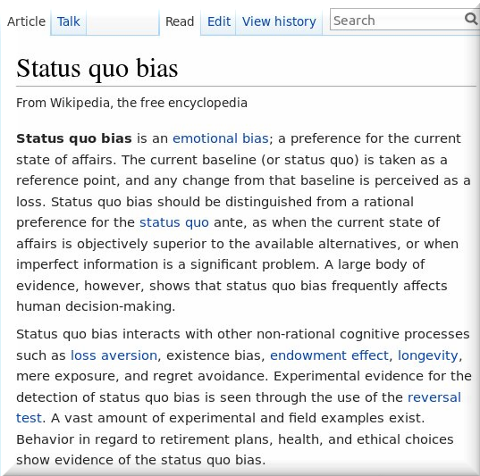
Reference: Status quo bias
Summary: In an effort to protect software patents in the United States, where these patents came from in the first place (and continue to spread from), patent lawyers pretend not to see cases where software patents get invalidated and instead focus on the rare exception
The Supreme Court ruled against software patents two years ago. Things have changed thoroughly since then. Right now patent lawyers hope that another software patent/s case will reach the Supreme Court, which can potentially change course and reset the record (precedence).
“It doesn’t seem as though anything that can change Alice is on the horizon.”Patent maximalists (lawyers) watch closely as the Supreme Court picks up cases. To quote Professor Dennis Crouch’s overview (he keeps updated this kind of SCOTUS zeitgeist): “It is now time to begin looking for an opinion in the Halo/Stryker regarding whether the Federal Circuit’s test for willful infringement is too rigid. Those cases were argued in February 2016. We can also expect a decision in Cuozzo prior to the end June 2016.”
It doesn’t seem as though anything that can change Alice is on the horizon. This is good news. The Cuozzo case we have already mentioned here earlier this month and last month. It’s not going to change takeaways from Alice.
“They would rather ignore or hide it from the public/judges/clients.”According to this new post, Enfish v Microsoft [1, 2] is already forgotten as CAFC rules against software patent, quite frankly as usual. It’s only when it rules for software patents that there is typically a media frenzy, initiated by self-serving patent lawyers. To quote IP Kat: “The patentability of computer-implemented inventions has been in doubt in the United States since the U.S. Supreme Court decision Alice Corp. v. CLS Bank. However, the recent Enfish v. Microsoft case provided some hope to those who favor patentability of computer-implemented inventions. The Federal Circuit has issued another patent eligibility decision, TLI Communications v. AV Automotive, et al. Notably, both Enfish and TLI Communications are authored by Judge Hughes–and reach opposite results, but on different facts.”
We actually found out about this two days ago. Patent Buddy showed that CAFC got back to killing software patents when he wrote: “(1/2)The ’295 patent killed by the CAFC today w/101 has a priority date of 1996. Its a pioneer patent.”
Are they already fixing the Enfish v Microsoft error? After less than a week? As Patent Buddy put it: “Federal Circuit Held Image Manipulation Claims Ineligible under 101/Alice Today: http://www.cafc.uscourts.gov/sites/default/files/opinions-orders/15-1372.Opinion.5-12-2016.1.PDF”
“Such is the nature of media that is dominated by patent lawyers and their interest groups…”Will patent lawyers quiet down now that this decision is out? Or maybe not mention this newer decision at all? Were the celebrations short lived? So far we have found just one article about this decision (and we watch these things very closely). At the same time, in spite of this newer decision (against software patents), patent lawyers are evidently desperate enough to latch onto the older decision. They just wish to make software patents stay in the US. See for example what Michael D. Van Loy and Howard Wisnia from Mintz, Levin, Cohn, Ferris, Glovsky and Popeo, P.C. have just published. Stinson Leonard Street LLP, likewise, cherry-picks the pro-software patents decisions, as usual. Gerard M. Donovan, Richard A. Graham, Amardeep (Sonny) Grewal and Marc S. Kaufman say that “Federal Circuit’s Enfish Is An Important 101 Decision” because it serves their agenda and it’s only a case like this which they are likely to cite in the future, not TLI Communications v. AV Automotive, et al.
MIP rightly called Enfish v Microsoft as it should. A “rare boost” is the way it got dubbed and MIP added: “The Federal Circuit has found software patents valid under Alice for only the second time, in Enfish v Microsoft.”
Compare that to the many times CAFC ruled against software patents, including the latest decision. Where were software patents lobbyists/proponents/boosters when these decisions happened? They would rather ignore or hide it from the public/judges/clients. Such is the nature of media that is dominated by patent lawyers and their interest groups… █
Permalink
 Send this to a friend
Send this to a friend
Posted in Europe, Patents at 2:50 pm by Dr. Roy Schestowitz
The EPO knows very well what it’s doing right now…
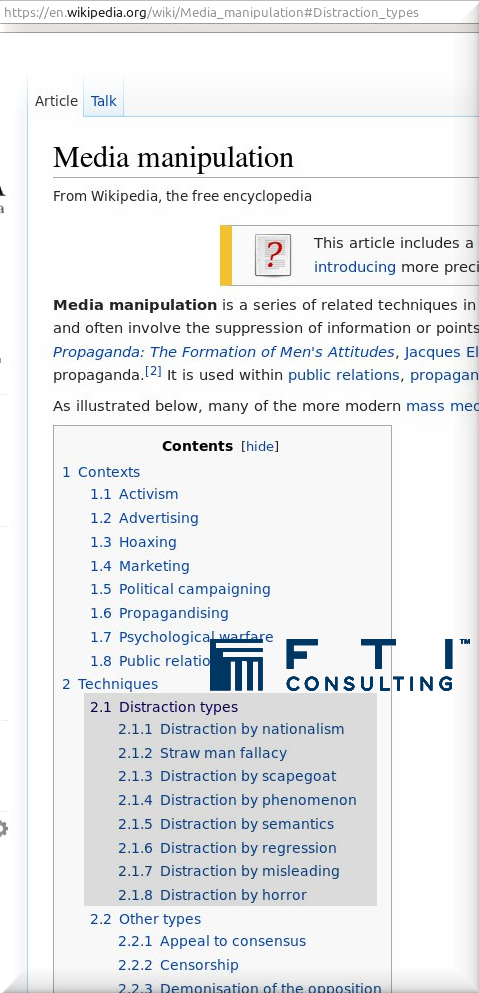
Media manipulation: Distraction types
Summary: What’s happening inside the EPO these days and what meaningless rubbish the management of the EPO would rather have the media obsessed with
THE EPO‘s decision to retaliate against former staff has met/invited a lot of resistance from the staff union, SUEPO. It’s only to be expected because the EPO not only stretches the law but most probably breaks it (not that it cares about having to refuse to obey court orders).
The EPO cannot justify its sheer abuses. It just keeps the latest PR/charm offensive going until the end of this month (to distract the media, which resorts to writing puff pieces like this new one). More publicity stunts from the EPO could be found today (shameless self-promotion from this scandalous institution). Not enough people are voting, so the EPO asks people to vote every day for well over a month. It sometimes even ‘spams’ [1, 2]. It’s rather pathetic and oftentimes painful to watch. As one might expect, there is also another kind of UPC lobbying from the EPO right now, promoting class war on behalf of large corporations (not even European corporations).
There’s a common saying, check what things are designed to distract from. Well, earlier today SUEPO issued a short statement under the headline “Letter dated 27 April 2016 from FICSA to FFPE regarding signature of Memorandum of Understanding on 2 March”. The enclosed document is this PDF and the short summary said: “On 27 April 2016, the Federation of International Civil Servants’ Association (FICSA) sent a letter to the Federation de la Fonction Pbulique Européenne (FFPE) regarding the Memorandum of Understanding (MoU) signed on 2 March 2016 between the EPO and the FFPE-EPO…”
As a recap regarding FFPE-EPO consider the following older articles:
- In the EPO’s Official Photo Op, “Only One of the Faces is Actually FFPE-EPO”
- Further Evidence Suggests and Shows Stronger Evidence That Team Battistelli Uses FFPE-EPO as ‘Yellow Union’ Against SUEPO
- “FFPE-EPO Was Set up About 9 Years Ago With Management Encouragement”
- Fallout of the FFPE EPO MoU With Battistelli’s Circle
- The EPO’s Media Strategy at Work: Union Feuds and Group Fracturing
- Caricature of the Day: Recognising FFPE EPO
- Union Syndicale Federale Slams FFPE-EPO for Helping Abusive EPO Management by Signing a Malicious, Divisive Document
- FFPE-EPO Says MoU With Battistelli Will “Defend Employment Conditions” (Updated)
- Their Masters’ Voice (Who Block Techrights): FFPE-EPO Openly Discourages Members From Reading Techrights
- Letter Says EPO MoU “Raises Questions About FFPE’s Credibility as a Federation of Genuine Staff Unions”
- On Day of Strike FFPE-EPO Reaffirms Status as Yellow (Fake/Management-Leaning) Union, Receives ‘Gifts’
- Needed Urgently: Information About the Secret Meeting of Board 28 and Battistelli’s Yellow Union, FFPE-EPO
- In Battistelli’s Mini Union (Minion) It Takes Less Than 10 Votes to ‘Win’ an Election
FICSA is not a newcomer to this. It already complained about the EPO’s management [1, 2] and now it has this to say to Battistelli’s allegedly ‘yellow’ union:
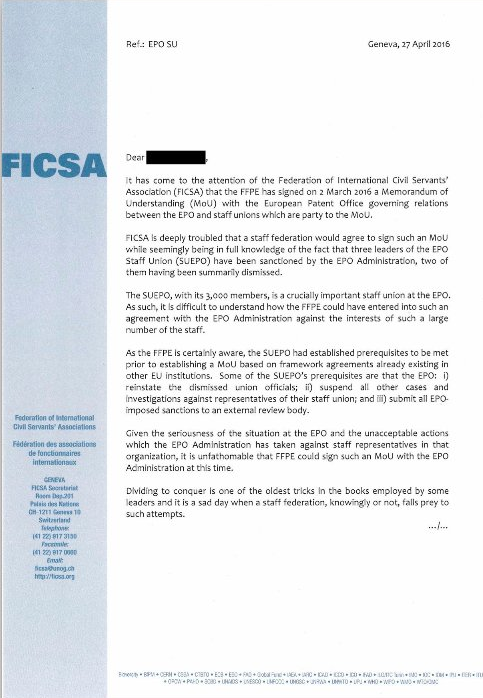
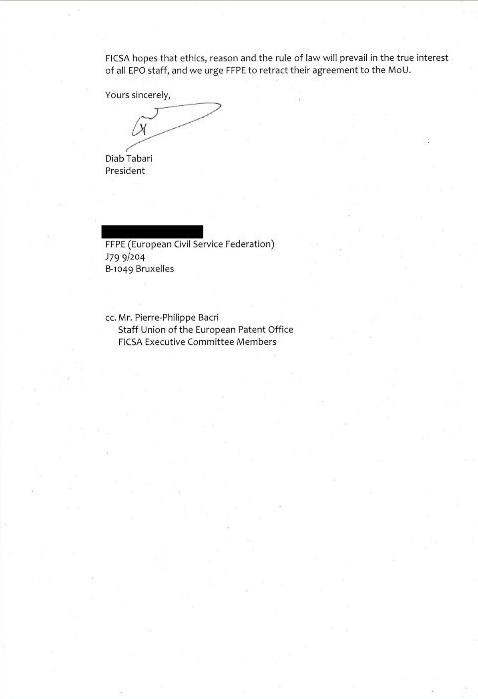
If someone can extract the text from the PDF and send it to us (or post it below in the comments), that might help. █
Permalink
 Send this to a friend
Send this to a friend
Posted in Europe, Patents at 2:14 pm by Dr. Roy Schestowitz
“Disaster for the EPO.”

No people jump through the windows of this building, where Dutch law is still applicable (unlike the EPO)
Summary: A look at causes for desperation and immense pressure at the EPO, where pensions can be cut as means of reprisal and people can be denied employment even after they leave the European Patent Office (EPO)
THE EPO is still in a state of crisis, based on what Board 28 said. Nothing has improved since.
Battistelli found a regime at a level low enough even for him, having just visited Morocco (warning: epo.org link, also published separately in French). To be fair, after ignoring or breaking European laws he can’t make friends. Not many politicians would wish to be associated with him in any way if they actually did their homework. Battistelli is somewhat of an outcast except within circles of dyed-in-the-wool patent maximalists and large patents-hungry corporations such as Philips.
Battistelli’s mistreatment of his own workers has earned him a zero (yes, 0%) approval rate/level, based on a recent extensive study (thousands of respondents). He not only abuses the staff while this staff works for the Office but also when the staff is ill. He is punishing them even after leaving the Office for good (after dismissing them under highly controversial circumstances). What kind of ‘President’ is this? Maybe the kind of ruler one might expect to find in Morocco or Tunisia.
Reflecting or remaking on the mistreatment of former EPO staff, several comments in IP Kat were too good to ignore. One person wrote:
Here’s an interesting question: what would be the consequence if an EPO employee (let’s assume for the moment a member of DG3) were to defy a “ban” imposed by the EPO president on taking up new employment?
Presumably, it would be impossible for the EPO to take legal action against their former employee. This is because such action would need to be launched before the national courts, which apply national laws and not EPO internal rules. (Plus, of course, the EPO might be reluctant to take action in the light of the very high likelihood that the EPO’s rules would be found to be contrary to national laws.)
Would that mean that the only action that the EPO could take would be depriving their ex-employee of the benefit of a pension from the EPO? If so, that could be a risky strategy – as it could open the door to legal action against the EPO. In such a situation, what defence could the EPO mount against an accusation of “stealing” acquired rights from their ex-employee? If the answer is their internal rules, then we return to the question of whether they would really want to try to justify those rules before a national court…
An issue here could perhaps be the challenge of getting a national court to accept jurisdiction for the dispute. However, it is arguable that the EPO’s immunity would not apply to disputes involving the proposed, new rules. This is because immunity of the Organisation applies only within “the scope of its official activities” (Art. 3(1) PPI). Further, such “official activities” are defined in Art. 3(4) PPI as “such as are strictly necessary for its administrative and technical operation, as set out in the Convention”. It is hard to see how it could possibly be argued that the new rules could be argued to be “strictly necessary” when the EPO has functioned perfectly well for decades without them!
Here is a response to this:
The Office would simply start disciplinary action and decide to cut the pension. And if you think you have a legal way out of that via the national courts, I suggest you inform the people recently dismissed about your findings.
Yes: I know about Art. 3(4) PPI. In practice, it is never applied. May I remind you that the Office was condemn by a Dutch court and that the Vice President said in front of Dutch TV that they will not follow the judgment? What more do you need?
There is also this:
Suing a former employee by the EPO may not be so easy, but withholding the pension = income is an extremely severe punishment for any former employee, but especially so for pensioners who want to continue e.g. as patent agents. And it such a case it is the EPO that has to be sued by the former employee, which, as we all know, takes years. By the time the pensioner has won that case, he is dead.
The issue of taking away people’s pension attracted some attention earlier this week. “This is quite an important question,” one person told me and another said [1, 2, 3]: “True as far it concerns national law procedure however they would immediately start an intern. disciplinary procedure and decide to cut your pension! Most probably without success! Sad but true this is Europe anno 2016 ! Hold your breath and be prepared it will even get nastier in the near future!”
Further (more recent comments) spoke about Ms. Hardon’s pension cut:
you may well be right. However, the only pension that I am aware of having been “cut” (that of Ms. Hardon) was apparently restored. I doubt that Monsieur le President reversed his decision purely out of the kindness of his heart… which might mean that there were other (e.g. legal) reasons that left him with no choice but to hand over what, in any event, were acquired rights.
The question of whether the EPO respects the judgement of a national court is, ultimately, a matter for the AC. That is, they have the power to order the president to respect any judgement – and to eject him if he refuses to do so and/or to lift his immunity. I guess that whether the AC decides to take any action depends upon how much political pressure they feel under from their bosses back home. Not the most ideal set-up for ensuring that fundamental rights are respected at the EPO, but not entirely hopeless.
Here is another interesting point: the proposed, new conditions of employment (including what those in private practice might see as an equivalent of a restrictive covenant for DG3 members… and perhaps others) were not those that EPO employees agreed to when signing up. Imposing restrictions on future employment is a very serious matter, and so requires the explicit (and informed) consent of any employee to be bound by such restrictions. With this in mind, how could the AC even contemplate rubber-stamping the unilateral imposition of such restrictions by way of “new rules” that have not received the consent of the employees that they affect?
That alone would appear to be a very good reason for the AC to simply dismiss the proposed rules out of hand.
“Batistelli has recently denied the AC the power to tell him what to do,” one person then added. “Disaster for the EPO.” Here is the full comment:
First, very good reasons have not been the guidance followed by the AC for a long time, even less so under the Batistelli administration.
Second, Batistelli has recently denied the AC the power to tell him what to do.
So what is the sum total of this picture?
Disaster for the EPO.
In relation to the Boards, which we wrote about in the weekend and early this week [1, 2, 3], one person said:
About the boards of appeal and the UPC: the UPC, as the EPO board of appeal and the German “Bundespatentgericht” foresees legal and TECHNICAL members. Finding legal members should not be too much of a problem (although the language requirements may prove to be a problem), but finding technical members will probably be. The technical members need to be:
-trained technically, basically they should have an engineering diploma
-fluent in the 3 official languages and
-trained legally (although not as much as a legal member).
Basically the idea is that the courts should have specialists able to understand in details what the Patent is about (especially important in difficult subject matter like chemistry, biotech, computers…).
In the EPO board of appeal and the Bundespatentgericht, the technical members were recruited from examiners.
The EPO board of appeal is the single largest collection of people filling the requirements of TECHNICAL members (especially when one considers language requirements).
Now Battistelli, being motivated by his personal vendetta against the board of appeal, has caused a major problem. In a well run office, the board of appeal would be sufficiently staffed, so that a fraction of their members could be sent to the UPC to train future staff and deal with the first cases. Battistelli closed that route twice: by making sure that they will be legally excluded to do so and by refusing to staff the EPO board of appeal for years. None of this is proper management: every manager knows that when a new branch is started, training new staff is a bottleneck. It is in all the management books.
There are quite a few other comments on this subject which we didn’t mention, but many seem to suggest that “Battistelli, being motivated by his personal vendetta against the board of appeal, has caused a major problem.” (or something along these lines)
We sure hope that EPO staff, including the Boards of Appeal, will fight back against Battistelli and his ‘baby’, the antidemocratic UPC. We welcome leaks relating to this subject. The UPC would be sunk if more of the European public knew the truth about the UPC force-feeding and what forces motivate this whole push. █
Permalink
 Send this to a friend
Send this to a friend
Posted in Australia, Law, Patents at 1:41 pm by Dr. Roy Schestowitz
The parasitic business of Davies Collison Cave not unsurprising (see below)
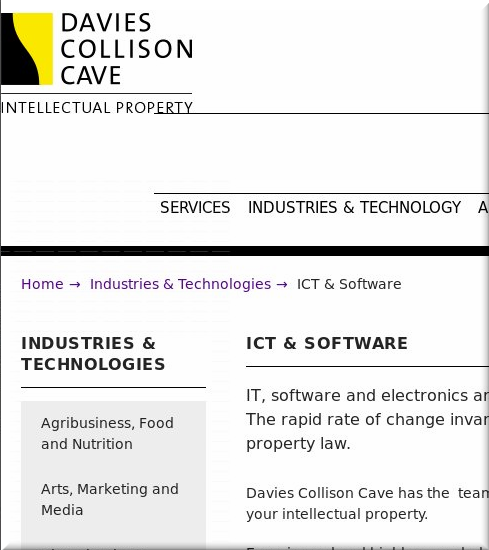
Summary: As the push against software patents grows in Australia, much to the chagrin of Australian software developers, Davies Collison Cave (patent law firm) publicly calls for opposition, calling its side “the truth” and pretending it represents “Australian innovators.”
EARLIER this month we saw the Australian Productivity Commission recommending the elimination of software patents [1, 2]. This was an important wake-up call not only to Australians but to governments all over the world, especially governments that write laws for the public interest, not for giant corporations (recall the Indian kerkuffle on this matter).
“This was an important wake-up call not only to Australians but to governments all over the world…”According to the financial (interests) media in Australia, the “WTO chief economist challenges Productivity Commission view on IP” because, as one must remember, WTO is a patents (or ‘IP’) maximalist. Remember who WTO truly represents. It’s like those same interest groups that are pushing for TPP, TTIP and their south-Pacific equivalents/complements.
The European Commission, facing the likes of the Productivity Commission, is now pressured “to ban patents on seeds”, which are still being granted at the EPO. “Tomorrow,” said an announcement, “a symposium on patents and plant breeders’ rights will be hosted by the Dutch Minister for Agriculture.”
Well, it makes sense to do so. Who benefits from patents on seeds? We covered this subject before.
“It’s like those same interest groups that are pushing for TPP, TTIP and their south-Pacific equivalents/complements.”Either way, patent scope boundaries are imperative. Without them, all we have is another USPTO and SIPO (China’s). They are both notorious for low patent quality.
The other day, writing in patent lawyers’ media, Spruson & Ferguson wrote about the Australian Productivity Commission report as follows:
Reforming the patentability of business methods and software inventions
Business methods have been defined as a method of operating any aspect of an economic enterprise, including ‘trading, transacting, finance, resource management, marketing and customer service’16. The Commission found that Business Methods and Software patents reward low– (or even no–) value innovations, and therefore, on balance, it is unlikely that granting patents in the area of Business Methods and Software increases the welfare of the community. While recommendations with regards to changes to the inventive step threshold for standard patents, and dispensing with innovation patents, may ‘knock out’ a large share of Business Methods and Software inventions, the Commission still considers that there is value in making clear that Business Methods and Software should not be considered patentable subject matters.17
Draft Recommendation 8.1 suggests that the Australian patent system should exclude Business Methods and Software from patent protection, as was done in a number of other countries.18 More particularly, it is recommended that section 18 of the Patents Act 1990 (Cth) be amended to explicitly exclude Business Methods and Software from being patentable subject matter. According to the Commission, amending the Patents Act 1990 (Cth) as recommended would minimise the ongoing legal uncertainty, and bring Australia into alignment with the approaches taken in other jurisdictions without impinging on international obligations.
A contrasting view is that, even if there is no case for patenting Business Methods and Software, it is not necessary to explicitly exclude Business Methods and Software from being patentable subject matter. The patentability of Business Methods and Software in Australia has already drastically been restricted by the courts, for example by the Commissioner of Patents v RPL Central Pty Ltd [2015] FCAFC 177 decision, by qualifying what constitutes a manner of manufacture within the meaning of section 6 of the Statute of Monopolies (i.e. section 18(1)(a)). Presently, business system inventions that are not within a ‘field of technology’ are not patentable. Accordingly, since that decision Business Methods and Software inventions generally do not meet the “manner of manufacture” criteria of patentability.
Not too long afterwards, the same lawyers’ site published this selfish, self-promotional call for opposition to the Commission’s findings, specifically calling for written support for software patents in Australia. Shame on Davies Collison Cave for lobbying for software patents in spite of Australian developers unequivocally rejecting and detesting them (we covered this some years back). To quote:
If patents for software are important to your business, then this message is also important for you.
The Productivity Commission has released a draft report which it intends to make final. It includes a recommendation that the Australian Patents Act be amended to explicitly exclude software from being patentable.
The Commission believes that software patents do not encourage new, valuable innovation. We suggest you tell them the truth.
Written submissions in reply to the draft can be made here by 3 June 2016.
It is time our Government heard from Australian innovators.
Yes, that’s right. They are “the truth.” And they are also “Australian innovators.” Like Microsoft front groups represent SMEs… █
Permalink
 Send this to a friend
Send this to a friend























 Content is available under CC-BY-SA
Content is available under CC-BY-SA